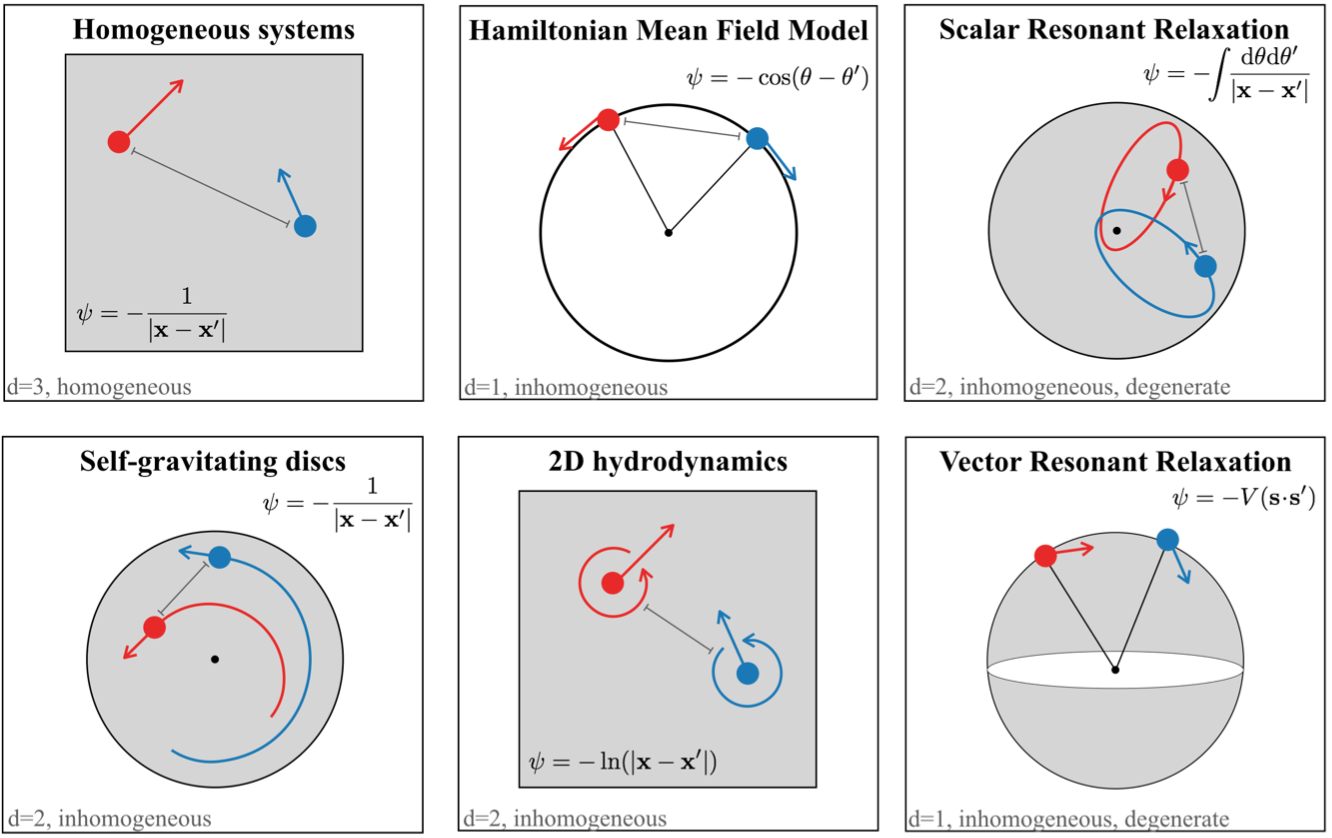Ph D Astronomy2021-Kinetic Theory
Kinetic Theory of Long-Range Interacting Systems
Astrophysical Context
Galaxies are unique laboratories to test the universal law of gravity, the driving force from their outskirts (the galactic disc) up to their inner cores (the galactic nucleus). As such, numerous observational, computational, and theoretical efforts have recently been devoted to understanding, modelling and explaining galaxies' cosmic evolution. In particular, recent theoretical breakthroughs in our understanding of the statistical kinetic theory of self-gravitating systems (e.g., the Balescu-Lenard equation) are now mature enough to follow, for the first time, the lasting effects of long-range coupled gravitationnaly-amplified perturbations on the orbital structure of self-gravitating systems.
To adequately model such long-term evolutions, one must account for these systems' key specificites. In particular: (i) galaxies are inhomogeneous, i.e. involve intricate orbits; (ii) galaxies are relaxed, i.e. dynamically frozen on some quasi-stationary distributions; (iii) galaxies are self-gravitating, i.e. can (strongly) amplify perturbations; (iv) galaxies are resonant, i.e. sustain a strong time dichotomy between the fast orbital motion and the slow secular diffusion; (v) galaxies are discrete and perturbed, i.e. are unavoidably submitted to some finite-N and external perturbations. Any attempt at quantitatively describing the long-term evolution of such systems must necessarily account for all these defining features, as they drastically impact the systems' long-term behaviours.
Upshot
This is where the heart of the present PhD project lies. Its objective is to develop and put forward long-range kinetic theories as efficient and predictive frameworks to approach the long-term evolution of self-gravitating systems in an unifying way.
As such, the PhD candidate will develop, tailor, and generalise the framework of long-range kinetic theory to make it a true, viable, and comprehensive alternative to more traditional techniques from astrophysical dynamics.
Objectives
- As argued in Bar-Or & Fouvry (2020) in the context of galactic nuclei, current inhomogeneous kinetic methods describe orbit-averaged diffusion. Beyond these dominant resonant effects, the PhD candidate will investigate the possible additional contributions stemming from non-resonant scattering and mean-motion resonances in dynamically degenerate systems.
- Astrophysical systems are not isolated, and are perturbed by their environment (Pichon & Aubert 2004). The PhD candidate will generalise the kinetic framework to describe open systems with a small or fluctuating number of (effective) particles, e.g., as is the case during violent relaxation.
- As emphasised in Fouvry et al. (2015) in the context of stellar discs, orbital diffusion can be strongly accelerated by coherent and resonant effects. To address the mystery of the stalling of dynamical friction in harmonic cores, the PhD candidate will derive the kinetic theory of fundamentally degenerate systems (such as harmonic potentials), where all particles have the exact same orbital frequency.
- As recently highlighted in Fouvry et al. (2020), owing to strong symmetries can be insensitive to classical 1/N diffusion, e.g. as in 1D plasmas. The PhD candidate will derive the appropriate 1/N^2 kinetic theory, sourced by three-body correlations and accelerated by collective effects, in that regime of very-long-time relaxation.
- Mean-field kinetic equations, such as the Balescu-Lenard equation, describe the average expected evolution of a system. Building upon Bouchet (2020), the PhD candidate will derive the characterise the stastistisc of (large) deviations of the dynamical w.r.t. to its mean evolution.
Requirement
Strong interest in theoretical astronomy, dynamics, analytical and numerical work.
Framework
The PhD will be co-supervised by Jean-Baptiste Fouvry and Christophe Pichon, as part of the SEGAL ANR (www.secular-evolution.org).







